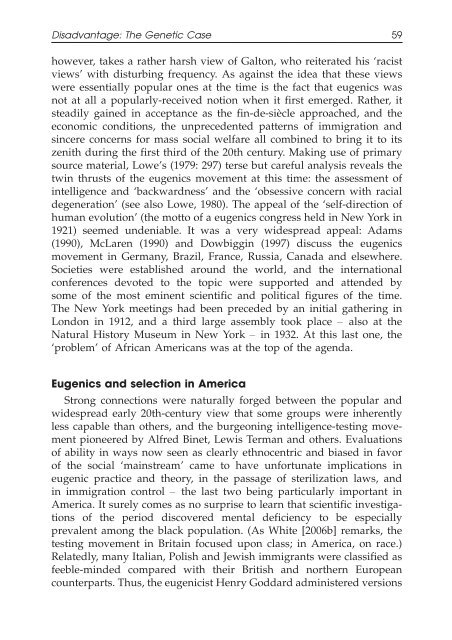Language Diversity in the Classroom - ymerleksi - home
Language Diversity in the Classroom - ymerleksi - home
Language Diversity in the Classroom - ymerleksi - home
- No tags were found...
You also want an ePaper? Increase the reach of your titles
YUMPU automatically turns print PDFs into web optimized ePapers that Google loves.
Disadvantage: The Genetic Case 59however, takes a ra<strong>the</strong>r harsh view of Galton, who reiterated his ‘racistviews’ with disturb<strong>in</strong>g frequency. As aga<strong>in</strong>st <strong>the</strong> idea that <strong>the</strong>se viewswere essentially popular ones at <strong>the</strong> time is <strong>the</strong> fact that eugenics wasnot at all a popularly-received notion when it first emerged. Ra<strong>the</strong>r, itsteadily ga<strong>in</strong>ed <strong>in</strong> acceptance as <strong>the</strong> f<strong>in</strong>-de-siècle approached, and <strong>the</strong>economic conditions, <strong>the</strong> unprecedented patterns of immigration ands<strong>in</strong>cere concerns for mass social welfare all comb<strong>in</strong>ed to br<strong>in</strong>g it to itszenith dur<strong>in</strong>g <strong>the</strong> first third of <strong>the</strong> 20th century. Mak<strong>in</strong>g use of primarysource material, Lowe’s (1979: 297) terse but careful analysis reveals <strong>the</strong>tw<strong>in</strong> thrusts of <strong>the</strong> eugenics movement at this time: <strong>the</strong> assessment of<strong>in</strong>telligence and ‘backwardness’ and <strong>the</strong> ‘obsessive concern with racialdegeneration’ (see also Lowe, 1980). The appeal of <strong>the</strong> ‘self-direction ofhuman evolution’ (<strong>the</strong> motto of a eugenics congress held <strong>in</strong> New York <strong>in</strong>1921) seemed undeniable. It was a very widespread appeal: Adams(1990), McLaren (1990) and Dowbigg<strong>in</strong> (1997) discuss <strong>the</strong> eugenicsmovement <strong>in</strong> Germany, Brazil, France, Russia, Canada and elsewhere.Societies were established around <strong>the</strong> world, and <strong>the</strong> <strong>in</strong>ternationalconferences devoted to <strong>the</strong> topic were supported and attended bysome of <strong>the</strong> most em<strong>in</strong>ent scientific and political figures of <strong>the</strong> time.The New York meet<strong>in</strong>gs had been preceded by an <strong>in</strong>itial ga<strong>the</strong>r<strong>in</strong>g <strong>in</strong>London <strong>in</strong> 1912, and a third large assembly took place also at <strong>the</strong>Natural History Museum <strong>in</strong> New York <strong>in</strong> 1932. At this last one, <strong>the</strong>‘problem’ of African Americans was at <strong>the</strong> top of <strong>the</strong> agenda.Eugenics and selection <strong>in</strong> AmericaStrong connections were naturally forged between <strong>the</strong> popular andwidespread early 20th-century view that some groups were <strong>in</strong>herentlyless capable than o<strong>the</strong>rs, and <strong>the</strong> burgeon<strong>in</strong>g <strong>in</strong>telligence-test<strong>in</strong>g movementpioneered by Alfred B<strong>in</strong>et, Lewis Terman and o<strong>the</strong>rs. Evaluationsof ability <strong>in</strong> ways now seen as clearly ethnocentric and biased <strong>in</strong> favorof <strong>the</strong> social ‘ma<strong>in</strong>stream’ came to have unfortunate implications <strong>in</strong>eugenic practice and <strong>the</strong>ory, <strong>in</strong> <strong>the</strong> passage of sterilization laws, and<strong>in</strong> immigration control <strong>the</strong> last two be<strong>in</strong>g particularly important <strong>in</strong>America. It surely comes as no surprise to learn that scientific <strong>in</strong>vestigationsof <strong>the</strong> period discovered mental deficiency to be especiallyprevalent among <strong>the</strong> black population. (As White [2006b] remarks, <strong>the</strong>test<strong>in</strong>g movement <strong>in</strong> Brita<strong>in</strong> focused upon class; <strong>in</strong> America, on race.)Relatedly, many Italian, Polish and Jewish immigrants were classified asfeeble-m<strong>in</strong>ded compared with <strong>the</strong>ir British and nor<strong>the</strong>rn Europeancounterparts. Thus, <strong>the</strong> eugenicist Henry Goddard adm<strong>in</strong>istered versions
















